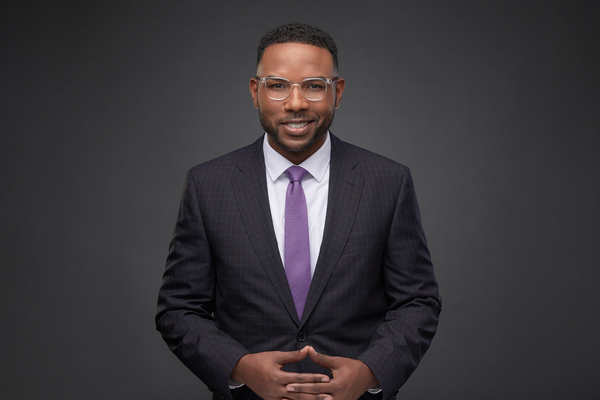Richard Fowler is the co-founder of the Richard Media Company, a Washington, D.C.,-based boutique communications and messaging firm that helps brands to better tell their stories and appeal to millennial audiences; host of Fowler Show, a nationally syndicated weekly radio program reaching more than 9.1 million homes; a contributor to FOX News Channel (FNC) in Washington, D.C., providing cultural, political and media analysis for primetime and daytime programs; a contributing writer at Forbes; and an adjunct professor of journalism at Georgetown University. A first-generation American born to Jamaican parents, he has trained close to 10,000 people on the importance of messaging and media strategy. He has worked to advance education and health policy reform with teachers, nurses, and higher education faculty to make their voices heard in decision-making processes across school districts, state governments, and Washington, D.C.
Fowler spoke with TNJ.com about his .
TNJ: How would you describe your role—and mission—as a journalist?
Fowler: As a storyteller and cable news contributor, I have the privilege of navigating the complex landscape of American culture and politics. My role involves breaking down complicated policy issues for audiences who deserve transparency and clarity from their leaders. It’s about ensuring everyone feels included in the conversation, especially those often left out. Policies at any level—federal, state, or local—have real consequences for everyday people. As journalists, it’s our job to elevate these discussions and hold those in power accountable. For too long, the voices of our most vulnerable citizens have been overlooked. My mission is to change that, to challenge the status quo, and to ensure our industry focuses on informing, empowering, and giving people a platform to reclaim their voices.
TNJ: What was your most challenging hurdle in the industry.
Fowler: As a Black man and a millennial, I’ve seen firsthand how our industry is undergoing significant changes. There have been positive strides, but progress can often feel slow. Recently, at a panel during the National Association of Black Journalists Conference in Chicago, we discussed the importance of Black voices in media. It became clear that we are at a crucial juncture. Although there’s been growth in citizen journalism and more representation in media leadership, the full spectrum of Black voices—both men and women—remains underrepresented. We need a media industry that truly reflects our diverse lived experiences. Without this diversity, we miss out on a richer, more complete portrayal of society, and that’s a gap I’m committed to closing.
TNJ: What advice would you give to an aspiring journalist?
Fowler: If you’re aspiring to be a journalist or anchor, start with a deep sense of curiosity and a commitment to truth. Journalism is about uncovering stories that matter, giving a voice to the voiceless, and ensuring those in power are held accountable. It’s essential to connect with the communities you report on. Our job goes beyond just delivering news; it’s about capturing the essence of people’s lived experiences. Work on honing your skills—whether it’s writing, interviewing, or public speaking. These are the tools of our trade. Be adaptable, as the media landscape is always changing. Embrace new technologies and platforms, but always remain committed to integrity and ethical reporting. Remember, journalism is a public service. Your words have the power to make a difference—use them wisely.
TNJ: Talk about the course that you teach at Georgetown University.
Fowler: Teaching at Georgetown University is one of the most rewarding parts of my work. My journalism course focuses on the power of storytelling to shape public discourse and drive meaningful change. We cover the basics—news writing, reporting, ethics, and media law—but we go deeper, exploring how to give voice to the voiceless and hold those in power accountable. I challenge my students to look beyond the headlines and dig into the issues that matter. We also explore how digital platforms and new technologies are changing storytelling. By the end of the course, I want my students not just to be skilled journalists, but also thoughtful storytellers who are ready to make a positive impact.
TNJ: What do you consider your greatest impact as a Black man in the media?
Fowler: Storytelling is a powerful tool, and it’s essential that it endure beyond just this generation. I’ve dedicated my life to connecting the global Black community through storytelling. As a first-generation American with Jamaican roots, I embrace the Jamaican motto—“Out of Many, One People.” Our shared struggles, experiences with racial discrimination, and the legacy of colonialism unite us as one global Black community. Whether I’m highlighting Black foodways, amplifying LGBTQIA+ voices, or countering misinformation that undermines our communities, my focus is on advancing narratives that uplift and center our culture and experiences.
TNJ: How did you go about selecting the best agent to represent you?
Fowler: Choosing the right agent was a deliberate and thoughtful process. I needed someone who understood the media landscape and shared my vision for impactful storytelling. It was important for me to find an agent who could see beyond the surface of my work and recognize my deeper mission—connecting and uplifting the global Black community. I started by researching agents with a proven track record in representing diverse voices. Personal recommendations and industry connections were also key. Once I had a shortlist, I had in-depth conversations with each agent to understand how they viewed my career path and how they would advocate for my interests. Trust and mutual respect were crucial. I chose an agent who aligned with my goals and understood the importance of my work. Having the right agent means having someone who believes in my vision and is as dedicated as I am to making it a reality.
TNJ: You are very accomplished. What next can the world expect from Richard Fowler?
Fowler: Thank you for the kind words! Looking ahead, I’m excited to continue using storytelling as a powerful tool for change. I’m committed to amplifying the voices of marginalized communities and addressing critical social issues. My focus will remain on fostering understanding and bridging divides, whether it’s on television, in print, or online. I’m passionate about empowering the next generation of leaders, particularly through my work as an educator. I love helping young journalists learn to tell impactful stories with integrity and empathy, ensuring the voices of Black, Brown and LGBTQIA+ communities, and other underrepresented groups are heard. In the future, I also plan to expand my efforts in grassroots activism and community engagement, hosting events and discussions that inspire civic participation. I’m dedicated to promoting the interests of teachers, LGBTQIA+ communities, and Black women, alongside other critical issues. Through my work, I aim to help organizations tell stories that drive positive change. Ultimately, my mission is to create a more equitable and just society by changing both hearts and minds, not just policies.
Social Media
X: @Richardafowler
Threads: @Richardafowler
Instagram: @Richardafowler
TikTok: @Richardafowler








